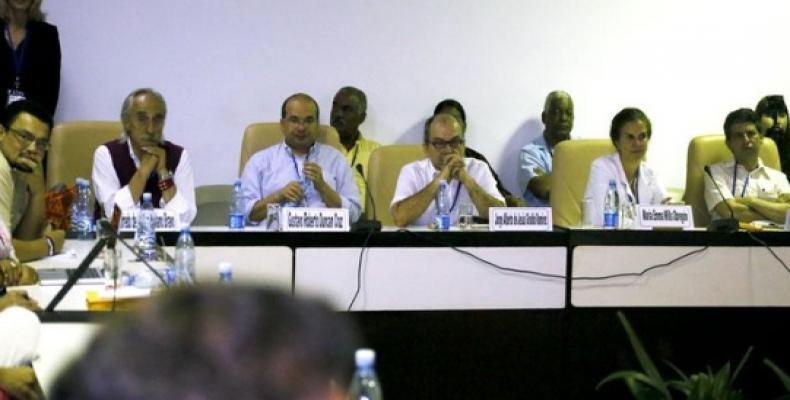Bogotá, October 8 (teleSUR-RHC)-- Rumors are circulating that teams currently negotiating a final peace deal between the Colombian government and the leftist Revolutionary Armed Forces of Colombia (FARC) are strong contenders for this year's Nobel Peace Prize to be awarded on Friday.
In a landmark meeting in Havana, Cuba on September 23rd, Colombian President Juan Manuel Santos and Rodrigo 'Timochenko' Londono, the top commander of the Revolutionary Armed Forces of Colombia shook hands after the two parties reached an agreement regarding transitional justice. The occasion marked the first time Santos and Timochenko had been pictured together.
The topic of transitional justice was seen as one of the more contentious issues and during the ceremony, Santos announced that the pair had agreed to reach a final peace agreement within six months and led many to conclude that peace for Colombia was finally at hand.
Several news outlets reported that Santos and Timochenko could be awarded the prize Friday. The list of nominees is notoriously secretive.
Political analyst Ernesto Borda told Reuters that the announcement in Havana was made possible because of the man chosen to lead the government negotiating team, Humberto de la Calle, who may be awarded the prize in the name of the negotiating teams.
Humberto de la Calle is a well-known figure inside Colombia, but not as well known outside the country. He has served as vice president and held a number of important posts throughout his political career.
The FARC's negotiating team is led by Commander Ivan Marquez, a veteran of previous peace talks between rebels and the government.
Formal talks began nearly three years ago with the government and FARC reaching partial agreements on land reform, political participation for ex-rebels and an end to the illegal drug trade. Parties are still negotiating the finer points of an agreement on the rights of victims, still pending are agreements regarding the end of the conflict and the implementation of a peace deal.
Despite some set-backs in the three years of negotiations, the conflict has been seen as slowly deescalating. The FARC continue to abide with a unilateral cease-fire, with the government also committing to not bombing FARC camps.


